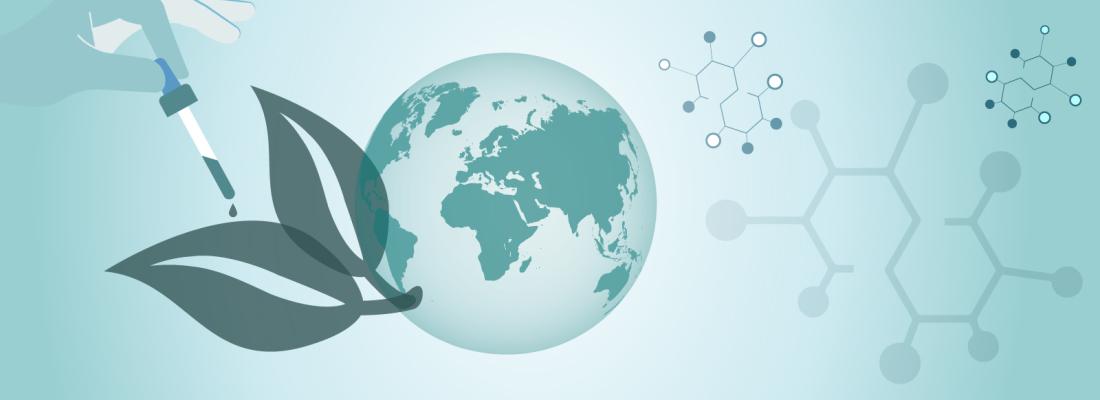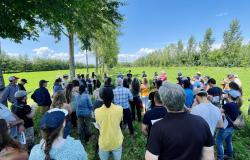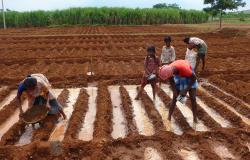Agroecology 7 min
Changing the world with living labs?
The first International Forum on Agroecosystem Living Labs, organised by Agriculture and Agri-Food Canada (AAFC) and INRAE, will be held in Montreal from 2 to 6 October 2023. In France and around the world, INRAE has been working for some ten years to develop living labs, these innovative and participatory research facilities that place the user at the heart of their preoccupations. What promises and challenges do these living labs bring with them? The Scientific Director of Agriculture at INRAE Christian Huyghe and project leaders in India and Africa take a closer look.
Published on 04 October 2023

Against a backdrop of growing global concern about major issues such as the preservation of biodiversity, access to food, human health and animal welfare, living labs are revealing their full potential.
"Science operating on its own is no longer acceptable: users and citizens are demanding to be heard and involved in research. By giving the user a central role, living labs go further than the participatory approach", explains Christian Huyghe. A participatory, multi-disciplinary approach to innovation, living labs aim to respond to complex issues on a local scale and in a “real” context. They are unique in that they include the user and involve all stakeholders on an equal footing.

Agriculture and Agri-Food Canada (AAFC) and INRAE are co-hosting the first International Forum on Agroecosystem living labs. Discussion panels and parallel sessions of scientific papers to establish state-of-the-art practices, share lessons learned from case studies and address challenges facing the international agroecosystem living lab community will take place on this occasion.
A democratic breeding ground for creative intelligence and stimulating innovation
From the very outset of a project, living labs include not only the direct beneficiaries of research, such as farmers, but also indirect beneficiaries such as consumer associations or environmental groups. In this respect, they are well suited to complicated, even conflictual and seemingly intractable situations. "All the players, with their different points of view, jointly work out the objective, the method and the path to get there, which allows for a vast range of possibilities to be explored. The aim is not to find a compromise, for example between agricultural production and environmental conservation, or the lowest common denominator between private and public goods, but to find a new solution that will be to everyone's satisfaction".
The democratic approach of living labs poses a number of challenges for those involved: "The fact that no one holds the truth at the start of a project upsets research habits and makes project evaluation more complex. Information asymmetry between direct and indirect beneficiaries is also a risk throughout the project: to avoid this, we need transparency and digital tools. Finally, the impact of a living lab is much faster on private agricultural property than on the environment or health, and we have to accept that.”
As living labs are geographically “grounded” systems, their interconnection is an added value reflected locally in the ones INRAE is developing: some INRAE “Territories of Innovation” are already clusters of living labs, such as VitiREV on viticulture in the Nouvelle-Aquitaine region, or Occitanum on digital technologies for the agroecological transition in the Occitanie region. “We are also strengthening relations between these regions on technical, administrative or scientific issues.”
INRAE, a pioneer in agroecology living labs in France and abroad
In line with its proactive open science policy, and inspired by the first Canadian living labs, INRAE already began investing in these pioneering schemes about ten years ago. The Institute first proposed two pilot projects to the French Ministry of Agriculture, focusing on animal welfare and transitions of farming systems for field crops. Other local projects subsequently emerged.
In 2018, the "Agriculture-Innovation 2025" plan encouraged the creation of living labs in order to facilitate the agroecological transition. A year later, INRAE was involved in 8 of the 9 agricultural projects that won the "Territories of Innovation" call for projects. INRAE is also encouraging living labs in the national TETRAE (a French acronym standing for transition of agriculture, food and the environment within the territories) programme in the 8 participating regions. The first promising results have been reported on the use of pesticides in vineyards, sustainable food and the use of forests.
Internationally, INRAE has been collaborating with its Canadian counterpart AAC since 2017. Together, they are in particular working on the theoretical framework of living labs, with the recent publication of a scientific article in Sustainability*. Indeed, as an innovative approach, living labs are in themselves objects of research: “Not only must we ensure that the living labs produce knowledge that would not have been produced without this device, but also that the questions they raise are debated: How can they be improved? When are they useful? How can policy-makers be involved in these initiatives?”
But that is not all: INRAE and its Canadian partners are working to develop these innovative systems around the world, by extending their collaboration to the United States, including the topic of living labs in the G20 agenda and organising the first international conference on agricultural living labs in Montreal. On the European side, INRAE is actively involved in the European Commission's "Agroecology and Living Labs" research and innovation partnership.
* McPhee C., Bancerz M., Mambrini-Doudet M. et al. (2021). The Defining Characteristics of Agroecosystem Living Labs. Sustainability, 13 (4), 1718. https://doi.org/10.3390/su13041718

A new generation of on-farm experimental activities, co-created with farmers, is opening up alternative innovation pathways in agriculture. An international team of researchers from 9 countries has been formed to establish the fundamental principles of the OFE movement and to make the case for its formal recognition and support.
Agroecological transition and evolution of food systems to improve human health in Africa and India
CliNSFoodS in India - Towards Climate Smart and Nutrition Sensitive Food Systems
The CliNSFoodS living lab project was launched by INRAE and its long-standing partner in India, the NGO BAIF (Bharatiya Agro Industries Foundation), at the first Knowledge Summit in 2018 in Delhi, against a backdrop of climate change and malnutrition that is threatening the health of India's population.
From its launch in 2019, BAIF sought a suitable site and local stakeholders who could commit to following the project and playing an active part in it. At the same time, French and Indian academic stakeholders were identified and brought together to jointly develop the project framework. "We decided together that the agroecological transition would be the central pillar of the living lab, with its keywords agriculture, food, water, energy and health. The main questions raised are, on the one hand, what the agroecological transition will bring to nutrition, and on the other, what its socio-economic impacts will be", says Edmond Rock, research director and project officer for India at INRAE's International Relations Directorate.
Today, an initial action plan has been drawn up: "Practices for the agroecological transition have been initiated with farmers since 2021. While programmes focusing on environmentally-friendly agricultural production are already being implemented in India, we now need to integrate nutritional security in order to locally adapt the crop diversity associated with food processing and balance it with a healthy diet required upstream. To do so, we have analysed the links between agriculture, food and people's health, so as to tailor recommendations to the local area, based on a “from plate to field”' concept.” Now based in a local basin at Bilikéré in the Mysore District, this living lab is intended to be extended to the entire district and even the State of Karnataka.
"Industrial agriculture, pesticides, climate variability, but also COVID-19... We need to understand their repercussions and revisit our food system with a holistic and integrated approach, in line with the agroecological principles set out by FAO," explains Dr Rajashree Joshi, BAIF programme director.
"In this way, our food system can become more climate-resilient and more protective of the environment and our health. To achieve this, we are working with farmers and consumers across the entire food value chain, from farm to fork. Farmers will need to derive economic security from the agroecological approach, but consumers will be the main decision-makers on the food systems and food production to be jointly developed with farmers and industries. We are delighted to be collaborating on this major project with INRAE, which produces scientific excellence at the service of action in the field, technological innovation and social progress. As for the living lab concept, it enables the continuous regeneration of knowledge and results that can benefit wider programmes. The model we are trying to develop can be scaled up, not only in India but also in France and Europe, in line with the Green Deal for the climate.”

INRAE CEO’s visit to India enabled the fourth renewal of the framework agreement initiated in 2003 with the BAIF, INRAE and CIRAD. Take a look at this hirtorical partnership.
MAHDIA in Africa - Combining Agroecology and Water Resilience for Sustainable Food Systems through Collective Intelligence and Territorial Support
As part of the international research initiative "Agroecological transition under water stress in the Mediterranean region for sustainable food systems" and the TSARA partnership (Transforming Food and Agricultural Systems through Research in Partnership with Africa), INRAE is developing the MAHDIA* living lab project. The aim: to create a link between the players involved in production, ecological transition and food in Tunisia, Senegal and Morocco. "In a context of severe water stress, we need to think about an agricultural model that is more sober, sustainable, rooted in the regions and meets local food needs", explains Sami Bouarfa, project leader and deputy head of INRAE's AQUA division.
The project involves INRAE and CIRAD researchers from France and the three partner countries. The National Institute of Agronomic Research of Tunisia, the National School of Agriculture in Meknes and the Senegalese Institute for Agricultural Research are already involved with a number of scientists in the fields of agroecology, water sciences, food sciences as well as human and social sciences.
Today, the challenge is to establish a framework for designing, developing and evaluating living lab systems that combine on the same level the players involved in food, agroecological transitions and water management in three urban and rural areas. “This project requires us to work in an interdisciplinary way, linking different approaches. It also requires us to go back and forth between identifying stakeholders and needs, a rather precise objective and very flexible action methods.” The design thinking began in Tunisia on a Maghreb-wide scale around the water-food-agroecology triptych, then extended to Senegal, in the wake of the TSARA initiative launched by INRAE and CIRAD in 2022. The plan is for these living labs to be set up on platforms that are already dedicated to agroecological projects: the Meknes region in Morocco, the Kairouan region in Tunisia and the town of Fatick in Senegal, with strong involvement from local authorities. “We are not starting from scratch, but from agricultural pre-networks that we will expand and broaden to include food issues.” All these players met at a seminar in Meknes from 12 to 14 September 2023 in order to define the outlines of a project to be financed around these objectives.
At a local and operational level, a territorial coordination system will provide a link between researchers, farmers and consumer organisations, however small, established to deal with food issues. “We will be able to rapidly get a firm foothold in the regions, so that these systems can enable the players involved to get together and talk to each other in order to jointly develop solutions. We are working towards a strong community ownership of these tools.” With this in mind, a partnership with the city and metropolis of Montpellier has also been set up for an international exchange of experience on living labs.
The Institute has launched the IRI approach, in line with its INRAE 2030 strategic roadmap. The aim is to work with scientific partners to mobilize national, European and international efforts to build a research agenda, and then to support ministries in the development of international initiatives including a research pillar. 6 themes have been supported since 2018.
